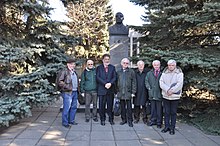Vladimir Alexeyevich Belinsky
Wladimir Alexejewitsch Belinski ( Russian Владимир Алексеевич Белинский , English transcription Vladimir Belinski; born March 26, 1941 ) is a Russian theoretical physicist who deals with gravitational physics and general relativity (ART).
Belinsky studied at the Moscow Institute for Physics and Technology from 1958 and was at the Landau Institute for Theoretical Physics from 1965 , where he received his doctorate in 1969. He stayed at the Landau Institute, completed his habilitation there in 1981 (Russian doctorate) and then worked as a senior scientist at the Landau Institute. 1989/1990 he was visiting scholar at the Yukawa Institute in Kyoto . Since 1990 he has been a scientist (with a teaching license) at the Istituto Nazionale di Fisica Nucleare (INFN, "National Institute for Nuclear Physics") in Rome and the University of Rome ( La Sapienza ). Today he is Professor at the International Center for Relativistic Astrophysics (ICRA) in Pescara .
He is known for a work on singularities in the general theory of relativity with Evgeni Michailowitsch Lifschitz and Isaak Markowitsch Chalatnikow around 1970. BKL singularities have been named after them since then and an unresolved assumption that these solutions, which were strongly oscillating at the time, were typical in GTR are.
In addition, from 1977 he discovered gravitational instanton solutions with Vladimir Evgenyevich Sakharov (Vladimir E. Zakharov) , and for the first time applied the method of inverse scattering transformation in the GTR, which they expanded there to the Belinsky-Zakharov transformation (1978). Black holes also belong to the exact solutions of the field equations of the GTR .
In 1974 he received the Landau Prize with Chalatnikow and Lifschitz . In 2012 he was one of the recipients of the Marcel Grossmann Award with Chalatnikow.
Fonts
- with Eric Verdaguer Gravitational Instantons , Cambridge University Press 2001, 2004
Web links
Individual evidence
| personal data | |
|---|---|
| SURNAME | Belinsky, Vladimir Alexeyevich |
| ALTERNATIVE NAMES | Белинский, Владимир Алексеевич (Russian spelling) |
| BRIEF DESCRIPTION | Russian theoretical physicist |
| DATE OF BIRTH | March 26, 1941 |
